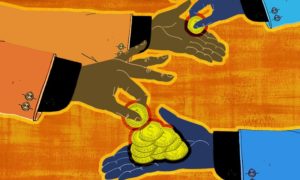
Imagine heading out to run errands at all your usual places, and your phone’s “equity app” has a better idea. Siri might say: “Buy your groceries at one of these other stores, just as close as your regular store.” Or: “There are three coffee shops within 2 miles. You haven’t tried this one before.”
We already get shopping suggestions when we bring up Google Maps, especially when our smartphones are transmitting our GPS coordinates. A similar type of computation is happening behind the scenes at Facebook and Twitter, whose targeted ads can sometimes be scarily on point.
But what if, instead of just boosting sales, those suggestions coming from your phone were designed to address social problems like inequality?
A group of researchers in France and Spain may have solved one preliminary puzzle toward getting us to that point. In the paper “Crowdsourcing the Robin Hood Effect in Cities,” published in June in the journal Applied Network Science, the researchers describe a computer algorithm they created that attempts to “rewire” the complex network of commercial transactions and shopping trips people take part in every […]









